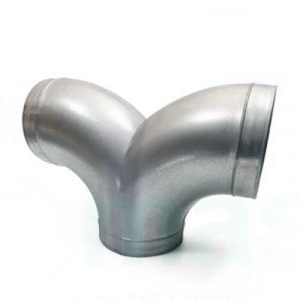A twin bend is a ductwork fitting that allows a duct to split into two branches at a right angle, forming a T-shaped junction but can also be fabricated at 45°s or other non standard angles. This component is essential in HVAC systems for distributing airflow to multiple locations.
Description:
Shape: T-shaped with one inlet and two outlets (or vice versa), forming a 90-degree angle between the branches.
Material: Manufactured from galvanized steel
Types: Twin bends can also be fabricated at 45°s or other non standard angles
Uses in Ductwork Systems:
- Air Distribution: Similar to tee pieces but offer better air distribution. Twin bends are used to split airflow from a main duct into two separate branches, directing air to different areas or rooms
- Balancing Airflow: Helps in balancing the distribution of air throughout the duct system, ensuring that all parts of a building receive adequate ventilation, heating, or cooling
- Connecting Different Duct Sizes: Reducing tee pieces allow for the connection of ducts with different diameters, adapting the system to various requirements
Installation:
- Cutting and Connecting: The main duct is cut to accommodate the tee piece, which is then secured using rivets or self drilling tek screws
- Sealing: Joints are ideally sealed with duct sealant but tape can also be used to prevent air leaks and maintain system efficiency
- Support: The tee and connected ducts are supported with hangers or brackets to ensure stability and prevent sagging
In summary, a tee piece is a crucial component in ductwork systems, enabling efficient air distribution by splitting airflow into multiple branches, adapting to various duct sizes, and facilitating system expansion and modification.

